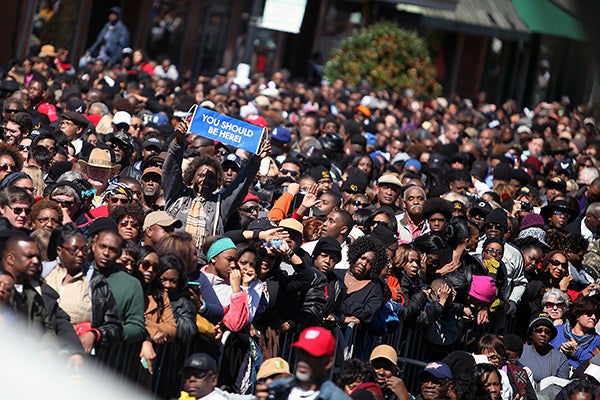Bloody Sunday honored by thousands
Published 11:03 am Monday, March 9, 2015

More than 40,000 people packed into downtown Selma Saturday, March 7, during the 50th anniversary of Bloody Sunday in Selma. (Justin Sellers/The Vicksburg Post)
Rarely are people aware when they are going to be a part of history, but as the faint glow of dawn spread over Selma Saturday, thousands were already up with just that in mind.
On a bluebird day, an estimated 40,000 people packed into the downtown area surrounding the storied Edmund Pettus Bridge to hear U.S. president Barack Obama speak and commemorate the 50th anniversary of the Bloody Sunday march, one of the most significant events in Civil Rights history.
As the day began, those hoping to catch a glimpse of the president queued up in a line that snaked through the city. People anxiously laughed and chatted, while working journalists made the first pictures of the day and started gauging the crowd.
One by one they made their way through metal detectors and past bomb-sniffing dogs, eagerly awaiting the chance to be a part of something bigger than themselves. Droves of spectators crowded onto Broad Street, the road that runs through the heart of Selma and all the way to the foot of the bridge.
The day wore on, and as the brisk chill of morning gradually gave way to a warm midday, gospel hymns could be heard occasionally rising above the dull roar of the ever-growing mass. State police passed out bottles of water to members of the crowd to battle the heat – a stark contrast, Selma Times-Journal editor Justin Averette pointed out, to the treatment of those civil rights activists beaten, trampled by horses and gassed 50 years ago on that day.
Excitement rose with the temperature as dignitaries, more than 100 members of Congress and former President George W. Bush and wife Laura arrived, culminating with cheers from the crowd when President Obama’s motorcade crested the bridge. Numerous speakers, including U.S. Rep. John Lewis, who was a part of the Bloody Sunday march as a 25-year-old student, addressed the crowd, but those in attendance were plainly there to hear remarks from Obama.
As he took the podium, Obama thanked Lewis and those with him that day in 1965 that changed the course of history.
“Because of what they did, the doors of opportunity swung open not just for black folks, but for every American,” he said. “Their endeavors gave the entire South the chance to rise again, not by reasserting the past, but by transcending the past.”
Obama stressed that although the country has come a long way, the job isn’t done yet.
“Our march is not yet finished, but we are getting closer,” he said. “Our job’s easier because somebody else already got us through that first mile.”
After his speech ended, the President joined dozens of others, singing and walking hand in hand, in a symbolic march over the bridge honoring those who did the same thing 50 years prior.
Those men and women in Selma on March 7, 1965 might not have been aware that what they were doing was going to play such a pivotal role in America, but those standing there Saturday did.
“There are places and moments in America where the nation’s destiny has been decided,” Obama said. “Selma is such a place.”





